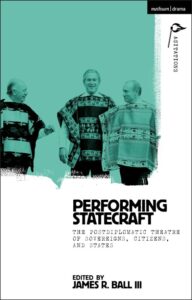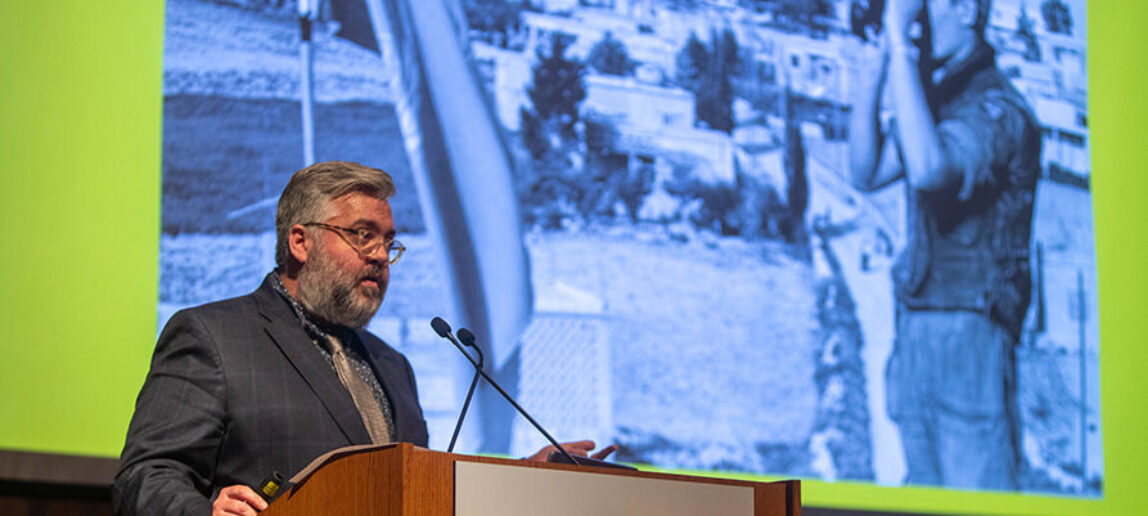Faculty Spotlight: Dr. James R. Ball III Explores Theatricality In Global Politics With Book Series
A family trip to Cyprus helped to spark a lifelong fascination with politics and performance for Dr. James R. Ball III.
The associate dean for industry and community engagement in the College of Performance, Visualization and Fine Arts grew up internationally, living in Malaysia and Malawi in his childhood. His father was a management consultant working in international development, and the family traveled frequently, with Washington, D.C., as a home base.
When Ball was a teenager, the U.S. ambassador to Cyprus arranged for the family to tour the demilitarized zone between north and south Cyprus. Members of a United Nations peacekeeping mission conducted the tour.
The mission has been in the area since a treaty was signed in 1974. The apocryphal story, Ball said, was that a drawing was made on an existing map to separate north and south, but the scale of the map and the thickness of the line created disputed elements. The boundary led to eye-opening moments on the tour.
“The UN peacekeepers guiding you would say, ‘Don’t go over there — there are mines.’ Or, ‘Walk around this side of that car, not the other side of that car, or they’ll shoot you. Because that’s disputed territory,’” he said. “Just a fascinating kind of experience for a teenager to be exposed to that.”

Ball has published two books that connect to these longtime interests: “Theater of State: A Dramaturgy of the United Nations,” released in 2020, and “Performing Statecraft: The Postdiplomatic Theatre of Sovereigns, Citizens and States,” a collection that he edited, which was released at the end of 2022.
In his graduate studies at New York University, Ball started thinking about politics and the law in a different way after learning about John Langshaw Austin’s speech act theory.
“Speechmaking or debate or treaty documents, legal writing and speech of all kinds, all of these things have this sort of theatrical quality about them,” he said. “They rest on a certain amount of repetition and convention. They have to be enacted to have effects. They operate as script sometimes. It was that sort of epiphany early in my graduate career that led me to begin to think of this project.”
A job working for a non-governmental organization that reported on the UN Security Council led to Ball’s doctoral dissertation, which eventually evolved into “Theater of State.” Its analysis includes the work of diplomacy as a form of performance, and how international institutions are depicted in culture and media.
“All those places where we have this theatrical or filmic image of the UN and the work it does,” Ball said. “And then specific encounters, places where suddenly there might be actors putting on a production of ‘Hamlet’ in the Economic and Social Council chambers. Or an ambassador might get together a group of her colleagues and take them to Broadway to see a production of ‘Fun Home.’ Or musicians playing concerts in the General Assembly. Or viral videos of the secretary general dancing with pop stars. All those places where the art and the politics come together and hit one another.”
In 2019, Ball convened a working group that examined performance and public diplomacy at the American Society for Theatre Research conference in Arlington, Virginia. A key question the group faced was the state of U.S. politics at that particular moment, Ball said: Why bother analyzing theatricality when the president is a former reality TV star?
“There’s a lack of subtlety to the degree to which it’s performance and performative,” he said. “What space is there for a scholar to say anything useful in the face of that if it’s so obvious? We thought that that itself was interesting, that we reached that point.
“It’s easy to say we’re in an era of politics in which the theatricality kind of amplifies divisions and is a tool for amplifying these divisions. The theatricality that is embraced by many of our political figures to play to a certain base, rile up a base, is kind of weaponizing these cultural elements of performance and other things in order to exacerbate those divisions, or at least to use those divisions to short-term political gain. At the same time, a longer historical perspective would remind us that level of theatricality is baked into a democratic system, because things need to happen in public, need to happen in front of an audience.”
“Performing Statecraft” was a direct result of the discussions during the research conference. Among the topics covered are Ireland’s 1916 rising against British rule, the UK’s Windrush scandal, the second U.S. war with Iraq, and a Native American artist performing for President Franklin Delano Roosevelt, King George VI and Queen Elizabeth in 1939. Dr. David Donkor, associate professor and graduate program director in Performance Studies, contributed a chapter titled “The President’s Yellow Batakari: Performance and the Sartorial in Ghanaian Politics.”
A key point of analyzing politics and performance is that the intent is not pejorative, Ball said: “We’re not saying it’s empty show, or that people are masking the truth. That there’s some shadow play going on, and then the real thing is happening behind closed doors. Instead, it behooves us to think honestly and rigorously about what is accomplished via the theatre that’s done in international institutions via these performances by heads of state, because they’re not just empty show. They do things on the world stage that have material effects.”
A third book manuscript is taking shape, focusing on immersive spectatorship and how artistic and cultural immersive experiences have surged in recent years. Ball noted examples including the school’s immersive Igloo cylinder, donated by ExxonMobil; 360-degree videos employed by CNN that put the viewer in the middle of a political event; and an influential immersive New York City experience titled “Sleep No More,” which helped to inspire a Houston escape room that incorporated theatrical elements called “The Man From Beyond.”
“I think about immersive spectatorship as a way of thinking about how we engage as citizens with our political world here,” he said. “Just as we might be immersed in a piece of theatre, we’re also immersed in the spectacle of politics and the way that we receive it and think about it and talk about it.”

